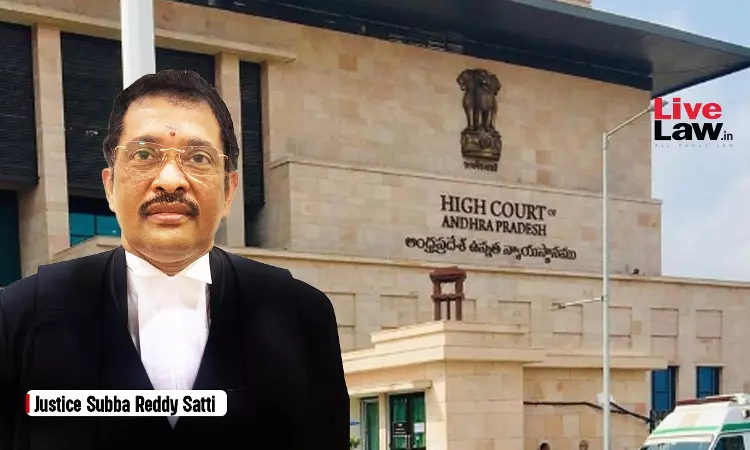- Home
- /
- High Courts
- /
- Andhra Pradesh High Court
- /
- S.138 NI Act | Lok Adalat Award In...
S.138 NI Act | Lok Adalat Award In A Criminal Case For Cheque Dishonour Can Be Executed By Civil Court: Andhra Pradesh HC
Fareedunnisa Huma
8 April 2025 4:40 PM IST
The Andhra Pradesh High Court has reiterated that an award passed by the Lok Adalat concerning a criminal case under Section 138 of the Negotiable Instruments Act is executable by a Civil court. For context, Section 138 NI Act pertains to dishonour of a cheque for insufficiency of funds in the account. Referring to Sthe upreme Court's decision in K.N Govindan Kutty Menon Vs....
The Andhra Pradesh High Court has reiterated that an award passed by the Lok Adalat concerning a criminal case under Section 138 of the Negotiable Instruments Act is executable by a Civil court.
For context, Section 138 NI Act pertains to dishonour of a cheque for insufficiency of funds in the account.
Referring to Sthe upreme Court's decision in K.N Govindan Kutty Menon Vs. C.D.Shaji and Section 21 of the Legal Services Authority Act Justice Subba Reddy Satti in his order held :
"Thus, given the authoritative pronouncements, the contention of learned counsel for the petitioner, that the execution petition filed by the decree-holder is not maintainable, lacks merit. This Court holds that the Execution Petition filed by the Decree holder, in pursuance of the award of the Lok Adalat, referred to supra, is maintainable."
Section 21 of the Act states that every award of Lok Adalat shall be deemed to be a decree of a civil court or, as the case may be, an order of any other court and where a compromise or settlement has been arrived at, by a Lok Adalat in a case referred to it under Section 20(1), the court fee paid in such case shall be refunded in the manner provided under the Court Fees Act.
It further states that every award made by a Lok Adalat shall be final and binding on all the parties to the dispute, and no appeal shall lie to any court against the award.
Background
Initially a private complaint was filed by the respondent against the petitioner for non-payment of dues. The matter was referred to Lok Adalat and an Award was passed directing petitioner herein to pay Rs. 5 Lakh as settlement amount.
When no settlement amount was received, the respondent filed an execution petition before the Civil Court. The petitioner filed a written statement and argued that no money was sought from him.
After considering the arguments, the trial court concluded that the petitioner had movable and immovable properties and had the means to pay the amount, however he had intentionally avoided paying the amount. The trial court ordered the petitioner to be sent to civil prison for 3 months on his failure to pay the amount. Against this, the petitioner moved the high court in a revision plea.
Findings
The high court was thus considering the question–"whether an award passed in Lok Adalat concerning the Criminal Case under Section 138 of the Negotiable Instruments Act, is executable by the Civil Court in case of default committed by the judgment debtor?"
The petitioner contended that an Award passed by the Lok Adalat in a criminal case could not be executed before a Civil Court. That the respondent had to avail the remedy available under section 421 of the CrPc (recovery of fines imposed by court).
The high court however observed that the matter was no longer res integra. It referred to Supreme Court's decision in K.N.Govindan Kutty Menon Vs. C.D.Shaji (2012) where the apex court had examined the Legal Services Act and had held that, "In view of the unambiguous language of Section 21 of the Act, every award of the Lok Adalat shall be deemed to be a decree of a civil court and as such it is executable by that court. The Act does not make out any such distinction between the reference made by a civil court and a criminal court. Even if a matter is referred by a criminal court under Section 138 of the Negotiable Instruments Act, 1881 and by virtue of the deeming provisions, the award passed by the Lok Adalat based on a compromise has to be treated as a decree capable of execution by a civil court".
It thereafter referred to various other Supreme Court pronouncements including Makwana Mangaldas Tulsidas Vs. State of Gujarat and Arun Kumar Vs. Anita Mishra, and upheld the trial court's order.
"Coming to the other aspect, i.e. means of the judgment debtor, the executing Court recorded a finding regarding the means of the judgment debtor and his evading payment. This Court does not find any perversity or illegality in the order passed by the Court below. There are no merits in the Revision, and the same is liable to be dismissed...Accordingly, the Civil Revision Petition is Dismissed," it said.
Case title: Rathi Vasudeva Rao vs. PVRM Patnaik
Counsel for petitioner: P Nagendra Reddy



